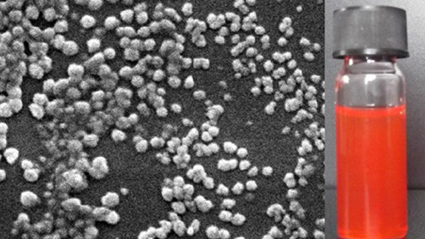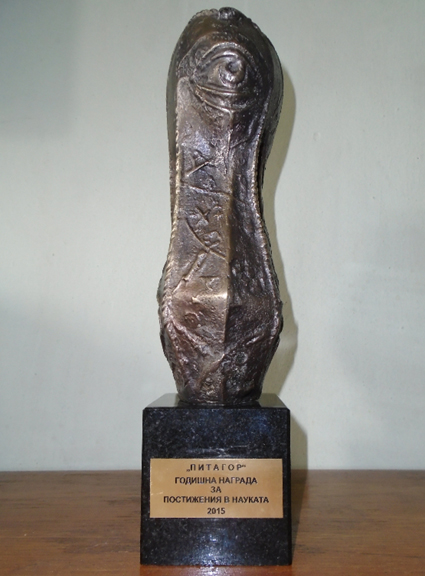The adventure called science has no beginning or end. Perhaps that was how Pythagoras himself used to think, as he was presented by the legend as a half god-half human, a wonder-maker who devoted himself to all types of mysteries. A hundred odd young Bulgarian scientists continue to follow their natural child curiosity, which makes them search for the answers of very complicated questions. Today we will introduce you to Associate-Professor Dr Georgi Yordanov who is this year's winner of the Pythagoras Prize in the Young Scientist category. The award was handed in for the seventh consecutive year by the Bulgarian Ministry of Education and Science. Georgi is a lecturer at the Faculty of Chemistry and Pharmacy at the Sofia University Saint Kliment Ohridski. He has a very impressive career behind his back for his fragile age. He wrote a series of publications in international magazines. Georgi earned high distinctions from chemistry Olympiad competitions in India and Denmark.
 “My research activities are directed in the field of Biomedical Nanotechnologies. Generally speaking, we produce nanoparticles, in order to use them in medical treatment and diagnosis. The nanoparticles are extremely small particles, a hundred times smaller than a red blood cell. Their task is to transmit medical substances. Our research is directed mainly towards the transmission of anti-cancer medical substances to the cancer cells. When the nanoparticles enter the blood system, they can reach the cancer cells, because the blood vessels in the cancer formations have openings in their walls. The normal tissue does not have such apertures and the nanoparticles can not penetrate them. In fact, the scientific field called Nanomedicine is based on this fundamental idea. ”
“My research activities are directed in the field of Biomedical Nanotechnologies. Generally speaking, we produce nanoparticles, in order to use them in medical treatment and diagnosis. The nanoparticles are extremely small particles, a hundred times smaller than a red blood cell. Their task is to transmit medical substances. Our research is directed mainly towards the transmission of anti-cancer medical substances to the cancer cells. When the nanoparticles enter the blood system, they can reach the cancer cells, because the blood vessels in the cancer formations have openings in their walls. The normal tissue does not have such apertures and the nanoparticles can not penetrate them. In fact, the scientific field called Nanomedicine is based on this fundamental idea. ”
In other words, Associate Professor Yordanov proves that thanks to nanoparticles the medical substances ca reach quickly the affected area of the human body without stratifying in other parts of the body. Thus, the side effect of the medicine is avoided, because each side effect is due to the accumulation of medical substances in healthy tissues and organs.
 The team of Associate Professor Yordanov works with material used for the manufacture of surgery glue. It is compatible with the human tissue and dissolves well inside the body. When this material enters the body, the nanoparticles do their job and then disintegrate. Bulgaria is among the few countries which produce such type of surgery glue. We also asked Associate Professor Yordanov whether receiving the Pythagoras statuette at Christ's age was a positive sign. Here is what Georgi Yordanov told Radio Bulgaria:
The team of Associate Professor Yordanov works with material used for the manufacture of surgery glue. It is compatible with the human tissue and dissolves well inside the body. When this material enters the body, the nanoparticles do their job and then disintegrate. Bulgaria is among the few countries which produce such type of surgery glue. We also asked Associate Professor Yordanov whether receiving the Pythagoras statuette at Christ's age was a positive sign. Here is what Georgi Yordanov told Radio Bulgaria:
“Yes, this a good sign. Every person has expectations and dreams. I am dreaming to finish what we started in Bulgaria. It is a very difficult task, because the scientific projects in Bulgaria are interrupted somewhere in the middle. For instance, we had a project under the Scientific Research Fund which was very well evaluated, but it was abandoned due to the lack of finance. Our main task is to complete our job to the end, despite all difficulties. I wish those who chose to walk on the road of science good luck, to have enough courage and keep their curiosity, which is the basis of science. As all chemists like to say we continue to look for the philosopher's stone", Associate Professor Yordanov said.
English version: Kostadin Atanasov
Aleksandar Vučić offers the opposition an advisory referendum on his presidency Serbs do not believe that the solution to the political crisis in the country could be an "advisory referendum" on confidence in the president, as requested by the..
Methodological assistance, teacher training, meetings and educational programs in Bulgarian language and culture for students – these are just some of the ways in which the academic community of Veliko Tarnovo University "St. Cyril and Methodius" reaches..
The Botanical Garden's Tropical Greenhouse will be open to visitors from 16 to 26 January, every day from 10 am to 4 pm. More than 30 varieties of azaleas, some of which once adorned the Royal Palace, will be in bloom. Blueberries, rhododendrons, ericas..
From the first attempts to fly with homemade wings back in the 19th century, to the world's first combat flights with reconnaissance and bombing..

+359 2 9336 661
